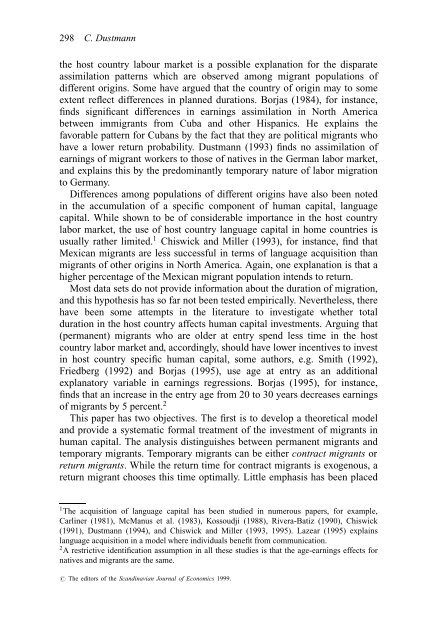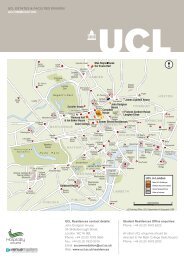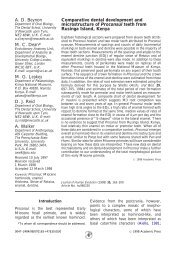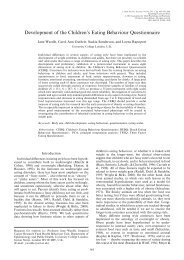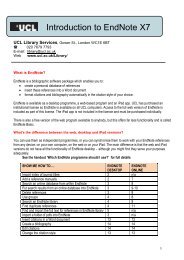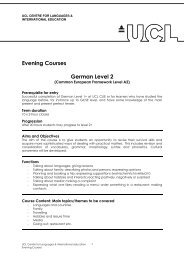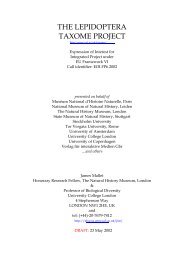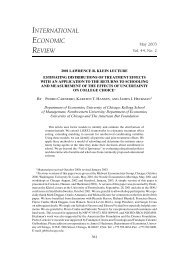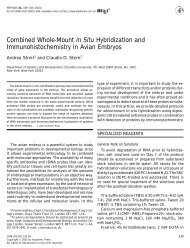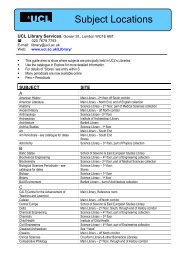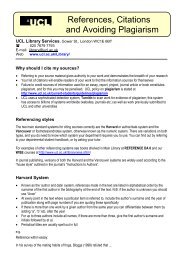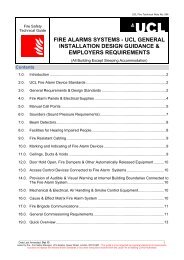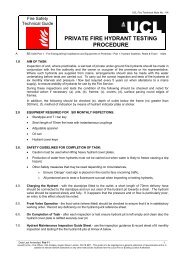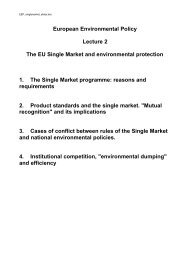Temporary Migration, Human Capital, and Language Fluency ... - UCL
Temporary Migration, Human Capital, and Language Fluency ... - UCL
Temporary Migration, Human Capital, and Language Fluency ... - UCL
Create successful ePaper yourself
Turn your PDF publications into a flip-book with our unique Google optimized e-Paper software.
298 C. Dustmann<br />
the host country labour market is a possible explanation for the disparate<br />
assimilation patterns which are observed among migrant populations of<br />
different origins. Some have argued that the country of origin may to some<br />
extent re¯ect differences in planned durations. Borjas (1984), for instance,<br />
®nds signi®cant differences in earnings assimilation in North America<br />
between immigrants from Cuba <strong>and</strong> other Hispanics. He explains the<br />
favorable pattern for Cubans by the fact that they are political migrants who<br />
have a lower return probability. Dustmann (1993) ®nds no assimilation of<br />
earnings of migrant workers to those of natives in the German labor market,<br />
<strong>and</strong> explains this by the predominantly temporary nature of labor migration<br />
to Germany.<br />
Differences among populations of different origins have also been noted<br />
in the accumulation of a speci®c component of human capital, language<br />
capital. While shown to be of considerable importance in the host country<br />
labor market, the use of host country language capital in home countries is<br />
usually rather limited. 1 Chiswick <strong>and</strong> Miller (1993), for instance, ®nd that<br />
Mexican migrants are less successful in terms of language acquisition than<br />
migrants of other origins in North America. Again, one explanation is that a<br />
higher percentage of the Mexican migrant population intends to return.<br />
Most data sets do not provide information about the duration of migration,<br />
<strong>and</strong> this hypothesis has so far not been tested empirically. Nevertheless, there<br />
have been some attempts in the literature to investigate whether total<br />
duration in the host country affects human capital investments. Arguing that<br />
(permanent) migrants who are older at entry spend less time in the host<br />
country labor market <strong>and</strong>, accordingly, should have lower incentives to invest<br />
in host country speci®c human capital, some authors, e.g. Smith (1992),<br />
Friedberg (1992) <strong>and</strong> Borjas (1995), use age at entry as an additional<br />
explanatory variable in earnings regressions. Borjas (1995), for instance,<br />
®nds that an increase in the entry age from 20 to 30 years decreases earnings<br />
of migrants by 5 percent. 2<br />
This paper has two objectives. The ®rst is to develop a theoretical model<br />
<strong>and</strong> provide a systematic formal treatment of the investment of migrants in<br />
human capital. The analysis distinguishes between permanent migrants <strong>and</strong><br />
temporary migrants. <strong>Temporary</strong> migrants can be either contract migrants or<br />
return migrants. While the return time for contract migrants is exogenous, a<br />
return migrant chooses this time optimally. Little emphasis has been placed<br />
1 The acquisition of language capital has been studied in numerous papers, for example,<br />
Carliner (1981), McManus et al. (1983), Kossoudji (1988), Rivera-Batiz (1990), Chiswick<br />
(1991), Dustmann (1994), <strong>and</strong> Chiswick <strong>and</strong> Miller (1993, 1995). Lazear (1995) explains<br />
language acquisition in a model where individuals bene®t from communication.<br />
2 A restrictive identi®cation assumption in all these studies is that the age-earnings effects for<br />
natives <strong>and</strong> migrants are the same.<br />
# The editors of the Sc<strong>and</strong>inavian Journal of Economics 1999.


